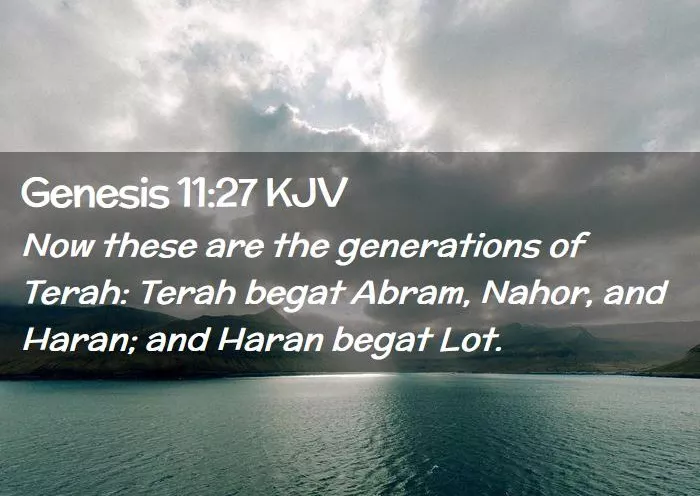Read the Daily Bible Verse Genesis 11:27 To Strengthen Your Spiritual Journey.
Genesis 11:27 marks a pivotal point in the biblical narrative, introducing the genealogy of Terah, the father of Abram (later Abraham), Nahor, and Haran. This verse serves as a bridge between the post-flood generations and the patriarchal narratives that follow, setting the stage for the story of Abraham, a central figure in the Abrahamic religions. Understanding Genesis 11:27 provides insight into the lineage and early life of Abraham, whose covenant with God is foundational to Jewish, Christian, and Islamic traditions.
The Context on Genesis 11:27 KJV
The King James Version (KJV) of Genesis 11:27 reads: “Now these are the generations of Terah: Terah begat Abram, Nahor, and Haran; and Haran begat Lot.” This verse is part of a larger genealogical record that traces the descendants of Shem, one of Noah’s sons, leading up to Terah and his offspring. The context of this verse is crucial as it follows the Tower of Babel narrative, where humanity’s languages were confused, and people were scattered across the earth. This genealogical account emphasizes the continuity of God’s plan through specific family lines, despite the dispersion of nations.
The Genesis 11:27 Meaning
Genesis 11:27 introduces Terah and his three sons, highlighting the significance of their lineage. Terah’s son Abram, later renamed Abraham, is a key figure in the Bible, known for his unwavering faith and the covenant he establishes with God. The mention of Haran’s son, Lot, also foreshadows future events, as Lot plays a significant role in the narrative of Sodom and Gomorrah.
The genealogical record serves multiple purposes:
Historical Continuity: It connects the post-flood generations to the patriarchal era, showing the progression of God’s chosen lineage.
Theological Significance: It underscores the importance of family and lineage in God’s redemptive plan. Abram’s call and covenant with God are central to the unfolding of biblical history.
Narrative Transition: It transitions the reader from the broader story of humanity to the specific story of Abram and his descendants, who will become the nation of Israel.
Genesis 11:27 Application in Life
The genealogical details in Genesis 11:27 may seem mundane, but they hold profound lessons for contemporary life:
Faith and Obedience: Abram’s story, which begins with his mention in this verse, is a testament to faith and obedience. His willingness to leave his homeland and follow God’s call is an example for believers to trust in God’s plan, even when it requires stepping into the unknown.
Family and Legacy: The emphasis on genealogy highlights the importance of family and legacy. It encourages individuals to consider the impact of their lives on future generations and to live in a way that honors their heritage and faith.
God’s Sovereignty: The genealogical record demonstrates God’s sovereignty in guiding history and fulfilling His promises. It reassures believers that God is in control, working through ordinary people and events to accomplish His divine purposes.
See Also: Genesis 11:26 Meaning, Context & Commentary
Comparison with Other Biblical Texts
Genesis 11:27 can be compared with other genealogical records in the Bible to understand its unique role and significance:
Genesis 5 and 10: These chapters also contain genealogies, tracing the descendants of Adam and Noah, respectively. Like Genesis 11:27, they emphasize the continuity of God’s plan through specific family lines.
Matthew 1:1-17: The genealogy of Jesus in the New Testament traces His lineage back to Abraham, highlighting the fulfillment of God’s promises through the generations. This connection underscores the importance of Genesis 11:27 in the broader biblical narrative.
1 Chronicles 1:24-27: This passage provides a summary of the genealogies from Shem to Abraham, reinforcing the significance of these family lines in Israel’s history.
Modern-Day Relevance
Genesis 11:27 remains relevant today for several reasons:
Understanding Biblical History: It provides a foundational understanding of the biblical narrative, helping readers trace the lineage of key figures and comprehend the unfolding of God’s redemptive plan.
Inspiration for Faith: Abram’s story, which begins with this verse, inspires believers to live by faith, trusting in God’s promises and guidance.
Cultural and Religious Identity: For Jews, Christians, and Muslims, the genealogy of Terah and his descendants is integral to their religious heritage and identity. It connects them to the patriarchs and the shared history of their faith traditions.
Conclusion
Genesis 11:27 is more than a simple genealogical record; it is a crucial link in the chain of biblical history, connecting the post-flood generations to the patriarchal narratives. It introduces Terah and his sons, setting the stage for the story of Abraham, whose faith and covenant with God are central to the Bible. This verse underscores the importance of family, legacy, and God’s sovereignty in guiding history. By understanding Genesis 11:27, readers gain insight into the continuity of God’s plan and the significance of faith and obedience in their own lives.
Genesis 11:27 Commentary
Commentaries on Genesis 11:27 provide deeper insights into its meaning and significance:
Historical Context: Commentaries often explore the historical and cultural background of Terah’s family, including their origins in Ur of the Chaldeans and their migration to Haran.
Theological Themes: Scholars highlight the theological themes of faith, obedience, and God’s sovereignty, emphasizing how these themes are introduced in this verse and developed throughout the narrative of Abraham.
Literary Analysis: Commentaries analyze the literary structure of the genealogical record, noting its role in transitioning from the broader story of humanity to the specific story of Abram and his descendants.
In conclusion, Genesis 11:27 is a foundational verse that introduces key figures in the biblical narrative and sets the stage for the story of Abraham. Its genealogical details, historical context, and theological themes provide valuable insights for understanding the Bible and applying its lessons to contemporary life. By studying this verse, readers can appreciate the continuity of God’s plan and the importance of faith, family, and legacy in their own spiritual journey.


